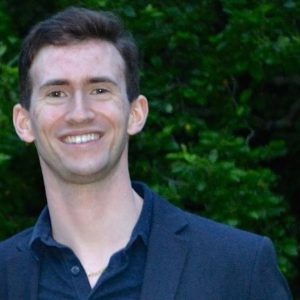
As a child in Syracuse, NY, Brian Hasset had little interest in technology. He preferred to spend his days playing guitar or baseball with friends. As he grew up and started thinking about college and the future, he entertained vague notions of being an engineer; he had an aptitude and appreciation for math and science but didn’t have a strong sense of what type of work would scratch his engineering itch.
By the time he reached Syracuse University in 2004, Brian had settled on civil engineering as a major. He didn’t feel terribly passionate about the material, but the course of study gave him invaluable experience: exposure to dense and difficult concepts in his textbook afforded him the opportunity to refine his problem-solving skills and practice patience. He would slowly and methodically work his way through complex problems, breaking them down into simpler sub-problems and exploring the relationships between various problem shapes. He learned to embrace the struggle.
When he graduated, Brian took a construction management job only tangentially related to his collegiate work. He found it to be an interesting field but was turned off by the emphasis on the management of human capital rather than technical engineering. It was good work but it simply wasn’t for him. In 2008 when the great recession hit, he fell victim to widespread layoffs in the industry.
Not one to be defeated by circumstances outside his control, Brian took the hit as an opportunity and pivoted. He attended law school at the University of Minnesota from 2010 through 2013. When he graduated, he leveraged his previous experience and moved back to New York to work as in-house counsel for a construction management firm in the area.
After a few years in this role, Brian reached a point where he found the work repetitive and not challenging enough to keep him interested and engaged. He faced a choice: either move up the legal ladder to work at a law firm or reconsider his career choice. The high-stress culture of advanced legal work didn’t appeal to him, so he began considering other options. Around this time he read Cal Newport’s “Deep Work,” a book about reducing distraction in the digital era, and was inspired by a story about a finance worker who decided to become a Software Engineer.
Brian began to research careers in programming and discovered coding bootcamps. He continued to research various modes of entry into the industry, but he also started teaching himself JavaScript in the mornings before work. At this point, his study was more about indulging curiosity than committing to the career path; but after a few weeks an unexpected realization dawned on him: he truly enjoyed coding. At that point, it became obvious to him that this was what he should be doing.
He chose JavaScript because it seemed like the most versatile and useful language to learn as a beginner — he wouldn’t realize just how true this assumption was until much later in his career — but also because it was the programming language of choice at Hack Reactor, which he considered the best Javascript coding bootcamp available. Brian tried to look beyond the glowing reviews but couldn’t find anyone with a bad experience. He even went so far as to peruse Hack Reactor graduates’ LinkedIn profiles to see if they were actually getting jobs — they were — and he began to realize that it was the real deal. He joined the Intermediate Full-Time Coding Bootcamp in December 2016.
Brian loved Hack Reactor’s Remote program. The commute — a short walk from his bedroom to his living room — suited him well, and during breaks he could relax on his couch or take a nap on his own bed.
That’s not to say it was easy. He credits his fiancée for her instrumental role in his successful completion of the program; she worked and took care of household responsibilities while he studied. Forging connections via online tools such as Slack and Zoom, Brian was able to build a strong network of fellow students.
Brian was overwhelmed at first, particularly since he started with less technical experience than the average person in his class. But after the first few sprints, everything started to click. In some ways, it reminded him of his experience with engineering in college: the slow and methodical process of grinding away at a problem until it made sense. It was an extremely challenging and exhilarating experience.
The thesis project Brian worked on was an app called Neighborly — think “Yelp for neighborhoods” — which was inspired by the fact that he’d moved nearly 10 times in as many years and wanted to be able to figure out what neighborhood to move to.
After graduating, Brian started his job search. He considered moving from Minneapolis to Seattle on the assumption that it would be easier to find a job in the northwestern tech hub but found that not to be the case. While there were more opportunities, the market was flooded with candidates. Doing the job hunt remotely wasn’t yielding the results he was hoping for. After two months he shifted to a more localized approach and had far more success.
The very first day he changed his LinkedIn profile location, a recruiter reached out to him and helped him land the role he’s still in: a full-stack engineering position working with React and Node for Best Buy at their headquarters in Minnesota. He loves that he’s part of a small team at a large company; he gets to contribute in a meaningful way and ship code that he wrote while also enjoying the many benefits of working for a large, stable international company.
Brian is amazed at what he’s accomplished and how far he’s come since he first started entertaining the idea of changing careers. An extreme skeptic, he didn’t really believe that Hack Reactor could be as good as everyone said or that he would be a mid-to-senior level software engineer when he graduated. But sure enough, less than a year later, it’s true. He’s living proof.
_____
Interested in exploring the same path? It all began at Hack Reactor. Learn more about Hack Reactor’s programs.
